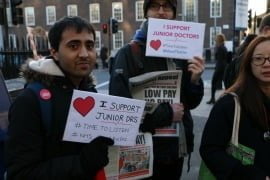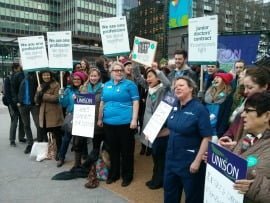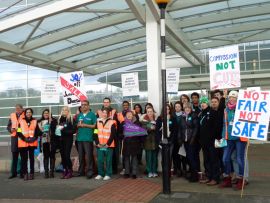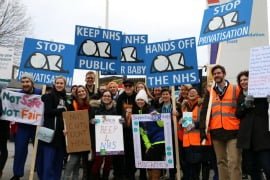Today saw the first of three scheduled actions by junior doctors in England, who are striking over attacks on their terms and conditions being pushed through by the Tory government. We publish here a range of reports from across the country, which highlight the militant mood amongst the doctors, as well as the wide level of support for those fighting to defend the NHS.
Today saw the first of three scheduled actions by junior doctors in England, who are striking over attacks on their terms and conditions being pushed through by the Tory government. We publish here a range of reports and interviews from across the country, which highlight the positive and militant mood amongst the doctors, as well as the wide level of support for those fighting to defend the NHS.
Royal London Hospital
Dozens of junior doctors were manning the picket lines outside the Royal London Hospital in Whitechapel this morning. Those on strike were buzzing with excitement and the picket was alive with optimism. While a chorus of car horns were honking their support along Mile End Road, one passer-by told the doctors that their enthusiasm was “inspiring”.
One junior doctor, Laali, told Socialist Appeal that all the consultants in the hospital were fully in support of their junior doctor colleagues. He said that everyone realised that if the junior doctors lost this fight, the consultants would be next in line for the cuts. The banner behind Laali read “Doctors and nurses UNITE!”, underlining the fact that this is a life and death struggle for the entire NHS, including those student nurses who are having their bursaries and support cut by the government.
 Another doctor carrying a banner reading “For an NHS that is safe and fair” explained that doctors are already stretched to the limit and that the proposed contract changes would have them working even longer for a great deal less money. She said it was becoming increasingly clear that the Tories’ aim was to starve the NHS of money so as to justify opening it up to the private sector as soon as possible.
Another doctor carrying a banner reading “For an NHS that is safe and fair” explained that doctors are already stretched to the limit and that the proposed contract changes would have them working even longer for a great deal less money. She said it was becoming increasingly clear that the Tories’ aim was to starve the NHS of money so as to justify opening it up to the private sector as soon as possible.
A doctor at King’s College Hospital recently told Socialist Appeal that he didn’t feel that he could stomach the way the NHS was being treated by the government for much longer. Today at the Royal London Laali said that, although he personally couldn’t imagine doing anything else (despite having looked into alternative careers recently), out of the 30 other doctors he did his training with, only four are continuing in the profession. The others have all quit entirely or are taking a year or two out to consider their options and look for something else to do. As he points out, “this is just the most phenomenal waste of talent and money, all because the government doesn’t treat doctors or the NHS properly”.
The doctors at Royal London this morning all said that they are optimistic about winning this dispute. They explained that it has got to the stage where neither side feels it can back down – but they are sure that Hunt and the Tories will be the ones to blink first.
The enthusiasm from doctors and the public on the picket line this morning proves that the BMA was right to call this strike. The doctors’ leaders must now live up to the expectations that their members’ have of them. It must be the Tories, not the doctors, who back down over this question and the BMA must do everything necessary to win the dispute.
Ben Gliniecki
University College Hospital, Great Ormond Street Hospital, and Homerton Hospital
 Members of the UCL and SOAS Marxist societies gathered from 8am this morning to join junior doctors on their picket line at UCH on the Euston Road. On the recommendation of those on strike, we helped leaflet commuters coming out of Euston Station, in order to discuss with the public about the strike.
Members of the UCL and SOAS Marxist societies gathered from 8am this morning to join junior doctors on their picket line at UCH on the Euston Road. On the recommendation of those on strike, we helped leaflet commuters coming out of Euston Station, in order to discuss with the public about the strike.
It was clear that the overwhelming majority of the public back the junior doctors’ strike, with many stopping to offer their support and a number of buses, taxis, and other drivers hooting their horns in solidarity. This was also demonstrated by the 66% support indicated in a recent IPSOS Mori poll for the BBC’s Newsnight programme.
Despite the best efforts of the government and their friends in the mainstream press to smear and slander the junior doctors, support for the doctors’ strike has remained solid. Indeed, the cack-handed and vitriolic attacks in the media have – in combination with the humourful, witty, and satirical responses by junior doctors on social media – helped the striking medics to gain even more support for their cause. The general public can see through the lies of the Tories and their obedient servants in the media, and understand that the junior doctors’ struggle is really part of a more general struggle to defend the NHS and fight back against austerity.
Those on the picket line outside Great Ormond Street Hospital were explicit in stating what they though the Tories’ aims are: to starve the NHS of resources; create a crisis within the public heathcare system; and thus pave the way for privatisation. Indeed, it transpires that Jeremy Hunt, the Tory health minister, has even co-authored a book that calls for the NHS to be dismantled and opened up to the private sector.
At the same time, those on strike today were fairly certain that the Tories would not budge, despite now being on the back foot as a result of this well organised and highly publicised strike. As a result, junior doctors who we spoke to this morning were convinced they would be back out again in a couple of weeks’ time, as the strike action escalates.
It is clear that the Tories, due to the logic of capitalism and austerity, have no option but to cut, thus bringing them into conflict with newly “proletarianised” sections of the working class such as the junior doctors. The militant response of the junior doctors is an example of how to begin the fightback.
Adam Booth
Support the junior doctors! Defend the NHS!
Posted by Socialist Appeal on Tuesday, 12 January 2016
Interview with Sarah, a junior doctor from UCH (questions by Ravi Mistry of the SOAS Marxists):
Q. What is the mood amongst junior doctors and in the NHS in general given Tory austerity?
A. Currently the mood amongst junior doctors and the NHS staff is quite demoralising. It’s the winter period anyway, so hospitals are really busy and staff are already working flat out 24/7 to care for patients, and the government as a whole do not understand that and are not supporting us on this. We feel that that there is a lot of negative press about the junior doctors despite people giving a lot of spare time and effort in supporting patients.
Q. Do you feel that despite the slander from the right-wing media in general, the public has still come out and supported you strongly?
A. So we’re doing a “meet the doctors” event here today and we have an official picket and other events around our main hospital site. The overwhelming response has been positive in general, and on the internet, but we have had a lot of horrendous and pathetic attempts to smear doctors. I just find it incredible, to be honest. It’s amazing the lengths the right-wing press and the government have gone to put us in a position where we seem like the bad guys. I weep about it; it’s really sad. None of us are in this for the money. If I wanted a job which payed a lot of money I’d go work in the City; I’m more than qualified to do so. But I love my job and I do it because of the patients and the difference you can make by being a doctor or a nurse in the NHS.
Q. I think the public do support you on this; you of all possible groups are probably the most difficult for the government and the right-wing press to vilify.
A. We hope so. We think there are a lot of other sectors of society too which are under pressure: teachers are under pressure; nurses are under pressure; firefighters, police, etc.
Q. We hear a lot about the privatisation of the NHS. Do you see the real impact of this?
A. Yes, we do in the long-term. In a lot of areas they have been cherry picking privatisation, which is easy to do, leaving the NHS with more difficult, complex patients which take up a lot of time, and take up a lot of resources, which leaves us overstretched.
Whipps Cross, London
 There were 40+ doctors and local supporters picketing outside Whipps Cross this morning. The mood was positive and excited. The strikers were visibly delighted when passing cars beeped their horns in support (someone was holding up a sign asking them to “honk if you love the NHS”). When asked what her experience of working within the NHS had been like, one trainee GP there said, “There’s a lot of strain but we knew what we were getting into. We love what we do and don’t expect praise for it, but to do an honest job and then get slated for it is causing a lot of anger.”
There were 40+ doctors and local supporters picketing outside Whipps Cross this morning. The mood was positive and excited. The strikers were visibly delighted when passing cars beeped their horns in support (someone was holding up a sign asking them to “honk if you love the NHS”). When asked what her experience of working within the NHS had been like, one trainee GP there said, “There’s a lot of strain but we knew what we were getting into. We love what we do and don’t expect praise for it, but to do an honest job and then get slated for it is causing a lot of anger.”
Another predicted that if the contract changes were to go through the NHS would be “reduced to a skeleton, two-tier system” and that the changes were unsafe because working hours would no longer be supported.
A surgeon who was handing out stickers and badges in support of the strike outside Walthamstow Central station echoed these concerns, saying that Trusts were currently monitored over the hours worked by junior doctors. The proposed changes would remove that monitoring, putting patient safety at risk. He added, “Lorry drivers and pilots have these safeguards, but we don’t. That doesn’t make sense.”
Striking doctors were also critical of the way the dispute had been handled by the government. One said that morale is low in the NHS at the moment and he’s not convinced the government took this into consideration.
Josh Holroyd
Cramlington A&E Hospital
Two Socialist Appeal supporters attended the Cramlington A&E Hospital picket line this morning. There were approximately 10 doctors, all under 30 years old, and all in good spirits.
We met the lead representative, who is a new Labour Party member and has attended Momentum meetings. We had a good discussion with him and he agreed with the need to widen industrial action and campaign to get Corbyn elected.
We discussed with a couple of other doctors, who were generally quite militant. All agreed for the need to bring the NHS back into public ownership in its entirety and a few had actually joined the Labour Party since the last election.
Importantly, we arranged to try and get a junior doctor speaker to attend the Trades Council tomorrow night to speak on the dispute, so we will have another opportunity to show solidarity then.
Steve Brown
Sandwell Hospital
I arrived at 08:30 to find one lone picketer – the BMA Local Representative. Soon we were joined by a lone junior doctor who had never done anything like this before, but who was eager to talk about the dispute and the email she had received at 08:15 from the Medical Director of the Trust declaring a Level 4 Emergency. The email called all doctors back on to the wards to aid in the capacity crisis. The BMA rep and the junior spent a few minutes clarifying the situation with the BMA, who advised that their position was that this was not what the emergency escalation process was supposed to cover.
We were soon joined by other doctors, at least one of whom had been spurred to join us by the email, which had really annoyed her. Why, for example, weren’t they calling in other staff from days off, etc. if it were a real emergency? Another doctor said she was in tears when she first saw the email, but she had clearly turned her frustration into a determination not to be misled and bullied back to work. The reality was that the agreement between NHS England and the BMA was escalation for major unpredictable incidents only, and as several junior doctors at Sandwell have pointed out, the letter calling them back referred to the situation over the previous few days and was dated yesterday!
The Sandwell and West Birmingham Hospitals NHS Trust said: “We decided to require trainee doctors allocated to ward work to attend Sandwell during today’s strike.”
The BMA released a statement saying:
“Junior doctors should continue with industrial action until NHS England has confirmed and the BMA has agreed – via the agreed escalation process – that a major unpredictable incident is taking place for a specific Trust. The BMA will notify members as soon as such an incident is in place.”
Support from the public and staff was high, with many passing motorists, buses, ambulances and hospital transport drivers sounding horns and waving in support. Workers from the hospital brought out hand warmers, cups of tea and other refreshments.
Two members of the Regional Committee of Unite the Union were present, one of whom represented the West Midlands TUC. They were accompanied by a member who had joined just that morning.
Inside the hospital, the level of activity on the wards was clearly reduced over a normal weekday, with the only extra activity being a manager scurrying around taking the names of doctors at work!
Activity increased during the morning as it became known that Sandwell was unique in the underhand tactics employed to try and break the strike. Discussions about the tactic continued, with feelings running high and a dawning realisation that this was a cynical move to try and demoralise them; to try and divide the junior doctors amongst themselves (between those who stayed out and those who returned believing it was a legitimate emergency, and also between the Sandwell site and the City Hospital site where no recall was issued); and also to try and alienate junior medical staff from non-medical ward staff who were also emailed advising that junior medical staff were to be called back in to help with the capacity problems.
National press and television were also soon in attendance, and the high morale among strikers and supporters continued until the official end of the picket at 12:30, with many saying they wished the picket could last all day!Chants of “No ‘Ifs’, no ‘buts’ no junior doctor cuts”, rang out at regular intervals, and we even got a friendly wave from a passing police car!
It is clear that both sides in this dispute are committed to their positions and that this is not a dispute that will easily be resolved. If the tactics employed by Sandwell are to be replicated on future strike days it can only serve to strengthen the determination of the junior doctors. Such underhand methods by NHS management will join the long list of PR failures on the government side, which betrays their desperate attempt to avoid any example of a successful industrial dispute – an example that would drive a coach and horses through their attempts to cut across the green shoots of growing industrial militancy and other activism against austerity.
Sam Clemens
Worcester Royal Hospital
 The picket line at Worcester Royal Hospital had over 40 junior doctors participating over the day – only three short of the total on strike. A confident and positive attitude was maintained despite the biting cold weather. Members of the public overwhelmingly supported the strike and on many occasions the strikers got a round of applause from patients and visitors. All the people entering the hospital eagerly took leaflets explaining the junior doctors’ case.
The picket line at Worcester Royal Hospital had over 40 junior doctors participating over the day – only three short of the total on strike. A confident and positive attitude was maintained despite the biting cold weather. Members of the public overwhelmingly supported the strike and on many occasions the strikers got a round of applause from patients and visitors. All the people entering the hospital eagerly took leaflets explaining the junior doctors’ case.
Both Unison and Unite hospital reps came to the picket line to show solidarity, along with delegates from the Worcester Trades Union Council. Support could be counted in deeds: a visitor tried to give £20 to the doctors, but was told they could not accept it, so he went to a local supermarket and brought back two bags full of doughnuts, cream cakes and cookies. This was not the only sustenance – senior doctors were bring out coffees and teas all morning, whilst nursing staff purchased massive amount of sweets and chocolates. The joke here was that if the strikes continued this way, blood sugars and cholesterols would have to be checked!
These doctors are not the heartless villains that Jeremy Hunt tries to portray them as; if a major incident did occur and patients’ lives were threatened, these doctors would return to work. But on the picket line, much discussion was about Sandwell hospital, which was claiming a level 4 emergency regarding patient demand. This bogus attempt was used to try and blackmail the doctors at Sandwell to return; however, when the BMA asked for proof, suddenly the hospital was able to discharge patients and the demand vanished.
At Worcester, an incident did occur: an elderly lady fell just in front of the picket line and in an instance she was surrounded by 20 medics, a wheelchair was found, and a couple of doctors took her to A&E; luckily it was just bruising and she thanked the doctors on the way home and wished them luck. Again picket line humour came out, with the quip that if Jeremy Hunt had seen all these medics helping one old lady, he would have pronounced an over staffing of the NHS!
It was decided to take the issue to the city centre for a couple of hours. Here the support was mixed, with a few hostile to the junior doctors’ action. A nickname for these people was adopted: “grisly”. One grisly was a woman who harangued the junior doctors for striking, saying it was a vocation and they should be ashamed. Her arguments were met with firm politeness, but she would have none of it, claiming her husband was a consultant surgeon and he was against the strike. It was pointed out that the overwhelming number of consultants supported the action and had doubled up to ensure patient safety. At this point she claimed that her husband worked all hours God sends for no extra money. A small voice from the doctors said, “If I was married to you, I would work all hours God sends,” which with met with large amounts of laughter as she left.
It was not always negative: a woman took a leaflet from us, stating that her son was a junior doctor in London, and at that very moment her son rang from a picket line at a London hospital and she passed over the phone to the doctors and they chatted for a while on how positive the strike had been.
A large number of the public wanted to sign a petition, but this was not available. However, the doctors discussed this and will be forwarding this lesson to the BMA Regional Junior Doctors Committee. One idea was to get thousands of postcards signed by constituents to be sent to individual Tory MPs for their response.
The junior doctors’ action has had a positive effect inside the hospital, with nurses and midwives seeing industrial action as a positive solution to their problems. The example of a large turnout and a massive majority in favour of strike will not be lost on other health workers.
Andy Fenwick
Guy’s Hospital, London
Three Socialist Appeal supporters went down to the picket line at Guy’s Hospital this morning. It was hard to tell exactly how many people had turned up, due to a ridiculous anti-union rule that meant that only six people could be on the picket line at any one time. This obvious attempt to undermine strike action did not work out very well – it simply meant that the 30 or so people who turned up spread out over a larger area, making them more visible and able to get more people to sign their petitions.
The support for the strike was overwhelming. We completely filled our petition with signatures within an hour and got talking to several people from other professions who have also suffered due to cutbacks. One was an electrician at Kings College who was responsible for 2,000 student residences. He used to have six colleagues, but now has only one apprentice to assist him in his work. Like the junior doctors he is concerned about safety, because if he makes a mistake due to fatigue it could be a fire hazard. Another worker from KCL University said many of her colleagues had been made redundant due to cutbacks.
These couple of examples demonstrate that, despite media smears and misinformation, people see that this strike is part of a much wider struggle to protect our public services and workers’ conditions and wellbeing.
When we joined the official picket line we found everyone in good spirits and appreciative of our support. Those on strike were very optimistic, but believed that this dispute was part of a conceited attempt by the government to undermine the NHS.
Nathan Taylor
Whittington Hospital, London
 Interview with a striking junior doctor, by Henry Gray.
Interview with a striking junior doctor, by Henry Gray.
Guy: I’m here from Socialist Appeal with Rachel, a junior doctor striking outside Whittington Hospital. First of all, why are you striking here today?
Rachel: We’re striking because Jeremy Hunt, the Health Secretary, is trying to impose a new contract on junior doctors from August next year. What it will do is extend the number of hours we have to work, make us work more anti-social hours and cut our pay for doing so. We’re already a really overstretched workforce, and we just feel like it’s not safe for our patients to have us working even longer hours and this new contract is not fair for us either, so it’s important for us to show that we don’t support it and that we’re fighting against it.
Guy: It’s very brave of you to come out on strike, and there’s been an enormous amount of support for you. We’ve seen the public support in the demonstrations held by junior doctors, but also the news that the junior dentists have come out on strike with you. We’ve got teachers here on the picket line with you, the Fire Brigades Union, and other trade unions coming to support you. What role do you think that solidarity and the unity of workers play in this dispute?
Rachel: I think it’s really important for us to feel that our support is as widespread as possible, because sometimes the government’s point of view is quite powerful and certainly in the media there’s been a lot of misinformation and a lot of spin about the true facts [of this dispute]. We’re really grateful that people can see through this and that they’re showing support for something which is about the wider public sector, not just about us. We know that there have been a lot of cuts across the public sector, the effects of austerity are being felt very widely in other professions, and that other similar parts of the public sector are likely to come under the same sort of attacks as we are. So we really appreciate the support that we’re getting from our colleagues in the public sector.
Guy: Yes, that’s great to see. And in addition to support from other workers, the Shadow Chancellor John McDonnell said in his speech to the Labour Party Conference in September that the Labour Party led by Jeremy Corbyn would back any workers going on strike unconditionally. What support have you had from Jeremy and the Labour Party, and what more could be done?
Rachel: I think we’ve had some great support from the Labour Party. Here at the Whittington, Jeremy Corbyn is our local MP, and he has been very supportive, we’ve seen him here at the hospital. And we’ve also had some great support from the Shadow Health Minister Heidi Alexander – she’s spoken out for us in the House of Commons; in fact a lot of Labour Party MPs have been very supportive of us. It’s really important to have people fighting for our cause in the House of Commons.
In terms of what more the Labour Party could do, I don’t know. I think they have been very supportive. Obviously they’re not the ones in power. But actually they’ve spoken out in the House of Commons; they’ve spoken out in the media for us. It’s a very complicated issue and it’s sometimes quite difficult for people to get their heads around the facts, so I think to have people who have tried to understand our cause and to get across what we think are the important parts to it, we really appreciate that.
Guy: It’s good to hear you’re getting support from Jeremy locally as well. Finally, what do you hope to achieve through this struggle?
Rachel: In the short term, what we want to see is a fair contract for junior doctors. We want to see a contract which is fair in terms of the way we get paid and is also most importantly safe for the way that we work so we can treat our patients safely. That’s our priority at the moment. There are obviously a lot of other issues coming to the fore across the NHS, there are lots of funding cuts. We’re feeling the impact of that here: lots of our services are being cut. And obviously we hope that we can have an impact on that more widely as well. So we’re starting with the contracts issue and we hope that we can increase the recognition of how important the NHS is. It needs proper funding if it’s going to survive.
Guy: Thanks a lot for your time, Rachel. Sending solidarity from Socialist Appeal. If everyone showed the same bravery as you and your colleagues we could bring down this austerity government and end the system it defends.






